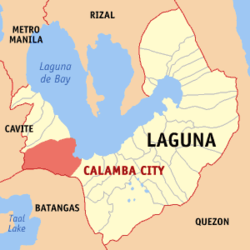Calamba City
|
Calamba City Kalanbanga |
||
|---|---|---|
| Component City | ||
| Lungsod ng Calamba | ||

(From left, clockwise):Jose Rizal (monument), Calamba Church, Calamba Giant Water Pot
|
||
|
||
| Nickname(s): Resort Capital of the Philippines The Hometown of Hero, Capital of the Philippines Lakeside City of Southern Luzon Claypot City of the Philippines |
||
 Map of Laguna showing the location of Calamba City |
||
| Location within the Philippines | ||
| Coordinates: 14°13′N 121°10′E / 14.22°N 121.17°ECoordinates: 14°13′N 121°10′E / 14.22°N 121.17°E | ||
| Country | Philippines | |
| Region | Calabarzon (Region IV-A) | |
| Province | Laguna | |
| Congr. district | 2nd District of Laguna | |
| Incorporated | August 28, 1742 | |
| Cityhood | April 21, 2001 | |
| Barangays | 54 | |
| Government | ||
| • Mayor | Justin Marc S.B. Chipeco (NP) | |
| • Vice-Mayor | Roseller H. Rizal (NP) | |
| Area | ||
| • Total | 149.50 km2 (57.72 sq mi) | |
| Population (2015 census) | ||
| • Total | 454,486 | |
| • Density | 3,000/km2 (7,900/sq mi) | |
| Demonym(s) | Calambeño | |
| Time zone | PST (UTC+8) | |
| ZIP code | 4027 4028 - Canlubang 4029 - Camp Vicente Lim (Mayapa) |
|
| Dialing code | +63 (0)49 | |
| Income class | 1st Class | |
| Website | www |
|
| City Mayor of Calamba City, Laguna Alkalde ng Lungsod ng Calamba (Tagalog) |
|
|---|---|
| Style | (Mr.) Mayor, Honorable Mayor |
| Residence | New Calamba City Hall Building, Brgy. Real, Calamba City, Laguna |
| Appointer | Elected via popular vote |
| Term length | 3 years (maximum of three consecutive terms) |
| Inaugural holder | Mateo Elojorde |
| Formation | 1901 |
Calamba (PSGC: 043405000), officially known as the City of Calamba (Filipino: Lungsod ng Calamba) and often referred to as Calamba City, is a component city of Laguna, Philippines. It is the regional center of the Calabarzon region. It is situated 54 kilometres (34 mi) south of Manila, the city is known as the Resort Capital of the Philippines because of its numerous hot spring resorts, which are mostly located in Barangay Pansol, Bucal and Bagong Kalsada.
According to the 2015 census, the city has a population of 454,486 people, making it the most populous local government unit in Laguna. It is the 5th densest city in the province with more than 2,600 people per square kilometer after San Pedro, Biñan, Cabuyao and Santa Rosa. Based on the overall rankings of the 2014 Cities and Municipalities Index, the city ranked 18th in the overall competitiveness (cities ranking) and 1st among cities in the Calabarzon region.
The City of Calamba is the hometown of the Philippine national hero, Jose Rizal.
The name of the city comes from a legend that during the early time of the Spanish period in the country, two "guardias civil" or soldiers were lost and passing through what is now Calamba. The soldiers met a young lady who came from a river carrying a jar of water and a clay stove. The soldiers unwittingly in Spanish language and in authoritative tone, to conceal the fact that they were lost, asked the local maiden the name of the place they were in. The lady, who speaks only her native language, naturally thought she was being interrogated about what she was carrying and nervously uttered "kalan-banga", meaning "clay stove" (kalan) and "water jar" (banga). Because the Spaniards could not pronounce it properly, the town has been called Calamba supposedly since then. This legend is immortalized with a large concrete water jar erected in the city plaza with the names of the city's barangays written on its surface. It is now known as Calambanga and is considered the "World's Biggest Claypot". This same jar is also found in the city's seal. The plaza was proposed by Dr. Agapito Alzona, then the town councilor to utilize the waste area where the old town market relocated from. The resolution was approved by the then town mayor Roman Lazaro and added additional P5,000 for the fence to the original P15,000 construction cost. It was completed in 1939.
...
Wikipedia


